Jeremy
Hogan
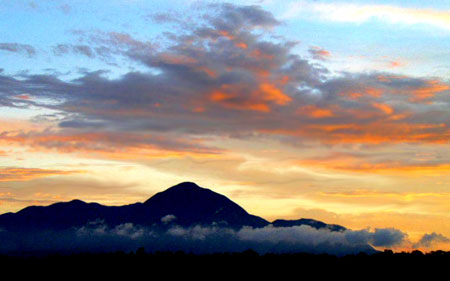
"Someday
I'll be reborn in that great city in another world system, in the past or future,
where the single 3-mile-high mountain stands against the blue sky – with
all my compassion with me, and all I'll need is the wisdom of the land."
- Jack Kerouac -
Part
I
I was 18 or 19
and standing in the living room there in my alienation a small Central California
town. In my hands I had a book I'd just picked up at the library book sale for
50-cents. In it was a story by a guy named Jack Kerouac … a fragment of a
story really …
I
didn't think my surroundings were too cool and I wasn't too cool on myself to
be honest. They call these creative coffins where I am standing - tract homes
- and they all look the same and people are judged by who is able to consume the
most. If someone doesn't have those good clothes and that nice car they are definitely
going to be judged and not well.
It
was a revelation that a writer who wrote about getting stuck in the central valley,
where I was currently standing would make the place sound cool. In this book,
he met a Mexican woman and tried to pick cotton. They went up and down the valley
looking for work but there wasn't any. He tried to go down to LA but found it
wasn't so easy.
Now
this was news to me, that some hipster, I actually I didn't know he was hip or
that his likeness would be used by rich kids to make themselves cool. All I understood
was that I was beat down and broke, I'd just come back from LA. Each morning my
soul drank the night and filled my stomach with the sad emptiness of suburban
life a year after my parents divorce and trying to find myself.
Here
I was standing in this alienation, among tract homes, and streets deserted in
the sad American, post-Vietnam, night. I didn't think anything around me was too
cool and I was aching to hit the road … anywhere in America seemed cooler
than where I was but some dude had bothered to write about Okies and the downtrodden
forgotten America like it was some place really …
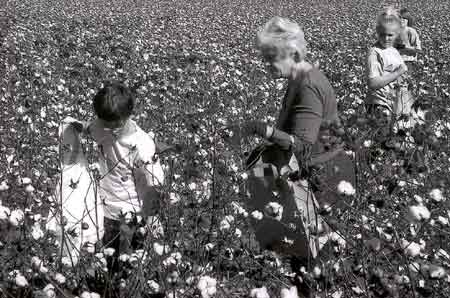
My
dad had picked cotton when he was seven and I'd tried to live in LA when I was
19. I'd even had a Mexican girlfriend. When I was a kid, I'd watched my dad drive
up and down the central valley looking for work on foggy November days and sometimes
I'd even gone with him. I lived in California and my father lived in Vietnam.
A few years later
he gave me his Camaro and one night a friend of mine and I had it up to 129 miles
per hour before we let off the gas because the car seemed like it might just catch
flight. In my 20s I drove that Camaro across the United States … living in
Indianapolis, Kansas City, West Palm Beach, Florida and Ann Arbor … looking
for America the whole time but only finding strip malls, fast food joints and
a disconnected population of people who would not, could not be united.
Oh
and Dean Moriarty … I'd been looking for my own grandpa. Someone said maybe
he lives out in Florida. That's a long way from here and there is no road through
those mountains that doesn't lead through LA.
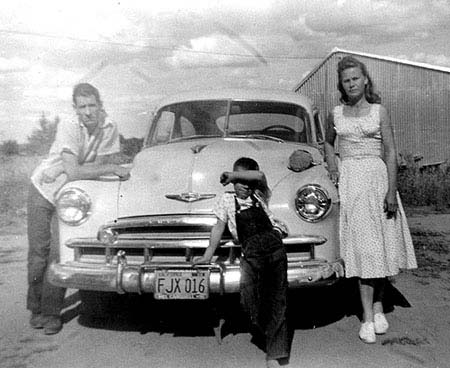
Part
II
Sometime after
the WWII my grandpa hit the road with the entire family and they had been sharecroppers
in Arkansas. I assume, since my grandpa was part Cherokee that didn't work very
well in his favor and he'd had enough of those fuckers is what he told me when
I went to visit him in Florida back in 1996. Somehow, I don't really know how,
he got the money for a car and they all hit the road. My aunt says sometimes they
lived in the car and sometimes there were temporary homes for migrant farm workers
and often they lived in tents. In the summer they would can food and buy staples
like beans because in the winter when there wasn't any work that's what they were
going to live on.
Sometime
around when my father was seven my grandpa split. With such enormous stress he
and my grandmother had been fighting. He jumped a train and was gone nobody saw
him for 25 years.
This
was during the 1950s. Exact proof that the so-called post-war economic boom wasn't
for everyone and just glossed over the issues of civil rights and poverty in the
United States. This is the America Kerouac was living in when he came out to the
central valley probably in the late 1940s. While, "On the Road," was
being consumed by middle class American's my own father was about to be sent off
to a foster home since his mother could no longer keep the family together.
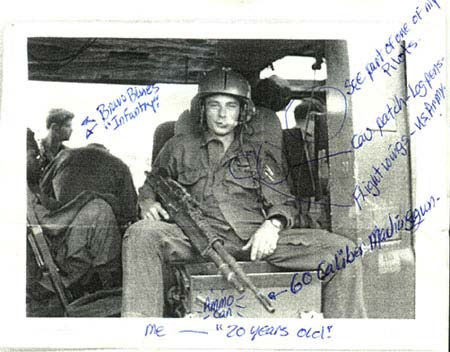
Sometime
around 1969, at age 18 or 19, my father joined the Army and went off to Vietnam.
Around the same time Jack Kerouac drank himself to death. They put my dad on a
helicopter; he later named the Magic Bus, in the 1st and 9th Cavalry and gave
him an M60 machine gun. Every day, often from dawn until dusk he would fly on
that helicopter as they put 11 Bravo and other troops into the jungle and took
them out. And he was often under fire.
I
spoke with him about this recently, he said the battles would start so fast that
everything would be in slow motion, sometimes he would actually see black dots
coming at him. Bullets with his name on them or the names of his buddies. His
heart would slow to a half beat and he would realize he was firing back. By the
time all this happened the helicopter would be full of infantry, the air full
of smoke and fire - the sounds of the wounded and dying and by the time they were
lifting off the Air Force would be dropping bombs – if they could get air
support.
Meanwhile,
at home people referred to people like my father as a baby killer. The country
written about in, "On the Road," was coming apart at its political seams.
In 1970, my father was in Cambodia and he was hit with shrapnel and he still has
a huge scar to prove it. The Ohio National Guard killed four at Kent State.
My
father has never really been home. The returning Vietnam Vets weren't welcomed
in the country they had been told they were fighting to defend. And it's spooky
to realize now that when we lived in the San Francisco Bay Area, I must have been
5 or 6 and my father and another Vietnam Vet were hanging out behind near some
train tracks getting stoned the war wasn't even over. It's one of my first memories
of this life.
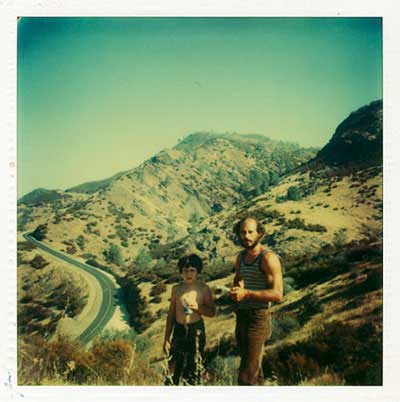
Later
in 1979 we moved to a tract home in Manteca, California but it wasn't long after
we moved. My father had quit his job and decided to move us to a mountaintop where
he was going to dredge for gold in the nearby creek and get away from the society
that didn't want him anyway. What a surreal year that was and it ended with my
dad beating the shit out of a yuppie at a pizza place. However, I'd already spent
the year being a Dharma Bum and didn't even know it and this would make all the
difference.
The
constant walks in the mountains the air ¬- a constant meditation. I went to
Yosemite several times that year and every morning I would ride a bus 21 miles
up though the cathedral of the canyons on the way to school. The light of the
early morning sun rained down like diamonds.
But,
I was invisible to America. And we moved again … this time to a town called
Porterville, California not very far from where Jack Kerouac had been picking
that cotton. Fifty miles north of Bakersfield. Years earlier, in Texas, my father
had done the same as Jack … 100 pounds for a dollar, until his hands bled.
He was on seven in 1956 one year before, "On the Road," was published.
Part III
Jack
Kerouac died while the Vietnam War was going on, he drank himself to death. I
understand why he hit the road. He must have been awfully disillusioned like I
was after I an outsider who drove the around the country during my 20s, finished
college, got a job, climbed the economic ladder and realized from the inside how
vacant and phony middle class life can be.
Jack,
we all have you with us, those that have read your words, you're still on the
road with us whether it's in the United States or in any other country where people
appreciate your literature. One day, together, we'll find that great city.
Jeremy
Hogan
August 26,
2007
To
Learn More About Jeremy Hogan visit
his website.
www.jeremyhogan.com